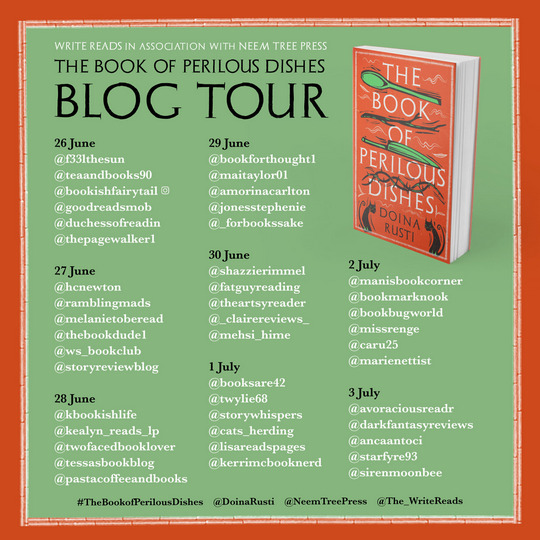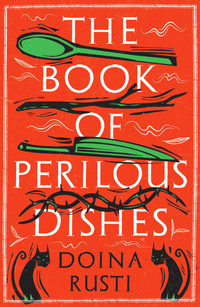
As the title implies, I’m in the middle of this book (59%), so this is not a full post, just some thoughts mid-way through. There were some challenges getting me a copy that my eyes could read, so I didn’t get the chance to finish the book on time. Many thanks to Dave at The Write Reads Tours for trying so valiantly to help.
 The Book of Perilous Dishes
The Book of Perilous Dishes
by Doina Rusti, James Christian Brown (Translator)
DETAILS: Publisher: Neem Tree Press Publication Date: May 21, 2024 Format: e-Book Length: 272 pgs.

What’s The Book of Perilous Dishes About?
This novel takes place in two distinct times, the majority of which starts in 1798 when fourteen-year-old Pâtca is forced to flee the only home she really knows because the city guards are raiding it to take in her grandmother (and anyone else they find there) for crimes imagined (and possibly real). She runs to Bucharest, the city she was born in, where her family had lived for a long time, and where her parents died when she was young.
She was told to track down her “little uncle,” Cuviosu Zăval, who could bring her to her parents’ home as well as provide for her. But Zăval is dead when she arrives—murdered, actually—and things get worse from there. Her meager possessions are stolen, she’s captured by criminals (possibly to be sold as a slave), accused of crimes and imprisoned, taken under the care of someone that she—and readers—cannot be sure she should trust, and…so much more (including several things I haven’t read yet).
Pâtca, Zăval, her grandmother, and who knows how many other members of her family, follow occult practices of various types. Some time back, Pâtca, compiled several recipes that are will bespell the eater into a collection called “The Book of Perilous Dishes.”
At the same time, the city is in turmoil. The current prince is about to be deposed (it doesn’t seem likely that he’ll be able to stop the fomenting rebellion). This prince recently took a slave, Silică, from a prominent citizen (the woman who will later assume Pâtca’s guardianship)—he’s a chef of a caliber that would get an invitation from the Chairman to take on Iron Chef in another time. Soon after she arrives in the city, Pâtca becomes convinced that Silică bought “The Book of Perilous Dishes” from her uncle, and is (unwittingly?) about to unleash chaos on the city unless she stops him.
(there’s a few other things afoot, but let’s stick with the story that the book gets its title from)
The other time is 1829, a.k.a. “The Present” is the perspective the 1789 story is being told from. We get snippets of what’s going on in Pâtca’s life there throughout the book—and the Table of Contents tells me that the last chapter will take place there. I’m really unsure beyond that what to say about it. I mean, obviously, Pâtca survives the tight places and dangers she faces (although that’s generally implied in first-person narration, but with the amount of ghosts/possible ghosts and other weirdness going on here, I’m not convinced that’d be guaranteed in this book)
That Opening
I can think of at least 4 books I’ve read in the last two years that have started like this*—guards/police/authorities/angry crowds, etc. coming for the protagonist/protagonist and their family and they have to flee their home to hide/take on a new persona/find a new home. I don’t bring this up to complain about the lack of originality or anything, it’s just something that occurred to me as Pâtca was being rushed out the door by her grandmother, Maxima.
Not only is it an exciting way to open a book—far better than a description of the weather or something—it almost guarantees that the reader will be hooked for at least a chapter or two, but it also tells the reader a lot about the novel and what to expect just from the opening pages. Odds are, not all of those who flee are going to make it—or someone is going to stay behind in an act of self-sacrifice, so you’ve got some tragedy right out of the gate. You’re also going to see your protagonist with a thirst for revenge, justice, or a resolve to carry on with whatever brought whoever to their door.
It’s an efficient and effective bit of writing and storytelling strategy. And Rusti pulls it off well.
* …and who knows how many in the last 40 years.
Rusti’s Writing
A good deal of the appeal to this book is Rusti’s descriptions and depiction of life in Bucharest. The way she describes certain people and Silică’s food, for example, just about justified what I paid for the book. For example:
If I tell you he was handsome, you will understand nothing. He was a man so luminous that you’d be drawn like a magnet to him from any distance. You couldn’t see his eyes. You couldn’t describe any of the features of his face. He was quite simply a soul that soaked into your flesh and blood. He was like water. He was a spark struck from the heart of a coal. He was the very breath of that noontide, fixed over the city.
That woman had a way of looking that was impossible to forget. She didn’t smile, but her face lit up as if she had drunk up all the events that she gazed at.
Beyond that, there’s just her language and way of telling the story. Largely this has to be Rusti’s culture and heritage shining through—the result is something that feels a lot less like our world than a lot of Fantasy/SF that’s supposed to be in worlds that have no relation to Earth. Tatooine, Qo’noS, and Krynn are a lot more like the U.S./U.K. than the world of this book—which is actually in Europe. This really shines forth brightly in this novel and adds a richness to the experience.
There’s a circuitous style to the way that Rusti moves the plot forward that’s both charming and frustrating. I’m not sure if I can describe it but I’ll try. She’ll begin a section at Step 10 (although you won’t realize that right away) and then slip to Step 2 (or 1) and proceed in order to Step 6 or 7, and maybe make you guess at/assume 8 and 9 while resuming at Step 10. Occasionally, she’ll throw a flashback into the middle of that.
I do wonder about some of the language used—there’s a formality to some of the writing and vocabulary that seems out of place to the pacing and atmosphere (and possibly, characters, I’m not sure about that yet). It’s not in every sentence or paragraph (which, I guess is why I said “some”), but it pops up often enough that I can’t help but take note of it. This is at least partially attributable to James Christian Brown, particularly when it comes to word choices—and what not to translate*. I don’t know how much of Rusti’s vocabulary is as formal as Brown’s, but for my purposes, I have to assume that if Rusti wrote this in English, it’d read this way.
* There is a handy-dandy glossary in the back of the book, I discovered too late, because why read the Table of Contents?
So, what do I think about The Book of Perilous Dishes so far?
I like it. I’m confused and/or uncertain about many things going on—I’m not even sure how much I like/trust/care about Pâtca, much less anyone else. But I’m intrigued and very curious about where this all is going.
It’s definitely one of those books that I’m going to have to read the last couple of pages of before I know what I think of the whole thing—I largely think that the journey is as rewarding as the destination when it comes to books—and certainly, the trip I’m on is pretty interesting. But this is going to be one of those books that I’ll have to look back at the journey once I arrive to decide if it was all worth it, pretty scenery notwithstanding.
At this point, I can say that this is a fascinating world, filled with riveting characters, and a story that’ll keep you wondering and guessing throughout (I’m willing to bet until the last ten pages). But I feel confident in saying that it’s worth a shot.
This post contains an affiliate link. If you purchase from it, I will get a small commission at no additional cost to you. As always, the opinions expressed are my own.

My thanks to The Write Reads for the invitation to participate in this tour and the materials they provided.




1 Pingback